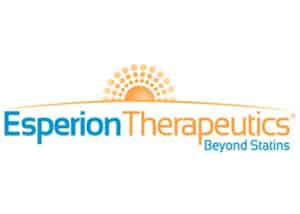 Esperion has seen almost a fifth of the value wiped off its shares as a phase III trial of its atherosclerosis candidate bempedoic acid revealed a three-fold increase in deaths with the drug compared to placebo.
Esperion has seen almost a fifth of the value wiped off its shares as a phase III trial of its atherosclerosis candidate bempedoic acid revealed a three-fold increase in deaths with the drug compared to placebo.
The pivotal trial, which was comparing bempedoic acid to placebo given on top of statins, showed that 13 patients on Esperion’s drug died, or 0.9% of the treatment arm, compared to 0.3% of the control group. The company has said it doesn’t believe the disparity was the drug’s fault, insisting the deaths occurred in patients with serious underlying diseases including heart problems and cancer, and saying that the death rate was just 0.5% if the cancers were excluded. It wasn’t however able to reverse the rout of its share price.
The mortality data weighed down what was otherwise a positive trial for bempedoic acid, which achieved an additional 20% reduction in LDL-cholesterol compared to placebo in patients with atherosclerotic cardiovascular disease (ASCVD) who were not able to control their cholesterol levels using statins alone. After 52 weeks the difference between drug and placebo was 16%.
The efficacy results – which also included a significant reduction in a marker of underlying inflammation associated with cardiovascular disease called high-sensitivity C-reactive protein (hsCRP) – are in line with an earlier phase III trial and the company has reiterated its plans to file for approval as a monotherapy and in combination with Merck & Co/MSD’s Zetia (ezetimibe) in the US next year or in the first quarter of 2019 at the latest, with European submission shortly afterwards.
There is speculation now however that the FDA may err on the side of caution and decline to approve the drug until Esperion has data in hand from a cardiovascular outcomes study, which isn’t due to report until 2023 – significantly delaying the programme.
Esperion is hoping to position bempedoic as a once-daily, oral alternative to PCSK9 inhibitor such as Amgen’s Repatha (evolocumab) and Sanofi/Regeneron’s Praluent (alirocumab), which are given by injection to high-risk patients who cannot control cholesterol levels using statins alone.
It has pledged to charge a lot less for the drug than its injectable rivals, which launched with a list price of $14,000 or more per year but are however being heavily discounted to try to overcome sluggish sales growth. That could reduce the opportunity for Esperion, particularly as the PCSK9 drugs seem to be more effective at reducing LDL-cholesterol, but even so haven’t been able to show a massive impact on mortality in cardiovascular outcome studies.
Esperion recently reported phase II data showing that the drug could however be used to improve cholesterol-lowering in highly treatment-resistant patients already on one of the PCSK9 drugs.




